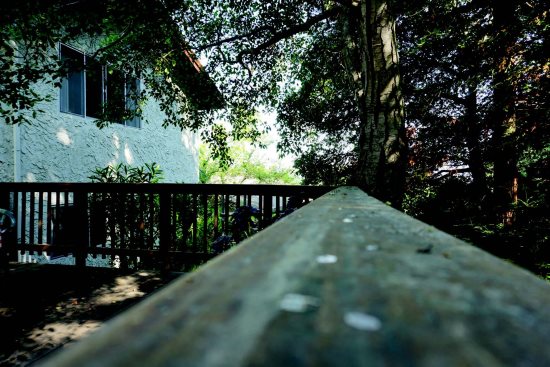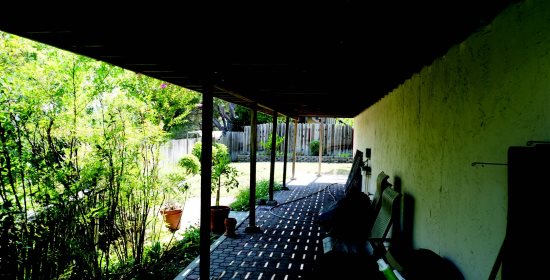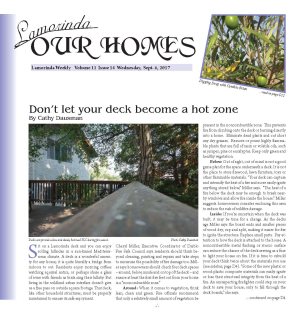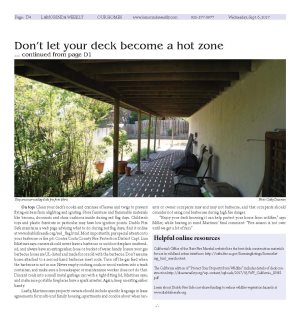| | Published September 6th, 2015
| Don't let your deck become a hot zone
| | | By Cathy Dausman |  | | Decks can provide solace and shade, but need TLC during fire season. Photo Cathy Dausman |
Sit on a Lamorinda deck and you can enjoy rolling hillsides in a sun-kissed Mediterranean climate. A deck is a wonderful amenity for any home; it is quite literally a bridge from indoors to out. Residents enjoy morning coffees watching squirrel antics, or perhaps share a glass of wine with friends as birds sing their lullaby. But living in the wildland urban interface doesn't give us a free pass on outside square footage. That deck, like other household structures, must be properly maintained to ensure its safe enjoyment.
 Cheryl Miller, Executive Coordinator of Diablo Fire Safe Council says residents should think beyond cleaning, painting and repairs and take steps to minimize the possibility of fire damage too. Miller says homeowners should check four deck spaces - around, below, inside and on top of the deck - and ensure at least the first five feet out from your home is a "noncombustible zone."
Cheryl Miller, Executive Coordinator of Diablo Fire Safe Council says residents should think beyond cleaning, painting and repairs and take steps to minimize the possibility of fire damage too. Miller says homeowners should check four deck spaces - around, below, inside and on top of the deck - and ensure at least the first five feet out from your home is a "noncombustible zone."
 Around: When it comes to vegetation, think lean, clean and green. Fire officials recommend that only a relatively small amount of vegetation be present in the noncombustible zone. This prevents fire from climbing onto the deck or burning directly into a home. Eliminate dead plants and cut short any dry grasses. Remove or prune highly flammable plants that are full of resin or volatile oils, such as juniper, pine or eucalyptus. Keep only green and healthy vegetation.
Around: When it comes to vegetation, think lean, clean and green. Fire officials recommend that only a relatively small amount of vegetation be present in the noncombustible zone. This prevents fire from climbing onto the deck or burning directly into a home. Eliminate dead plants and cut short any dry grasses. Remove or prune highly flammable plants that are full of resin or volatile oils, such as juniper, pine or eucalyptus. Keep only green and healthy vegetation.
 Below: Out of sight, out of mind is not a good game plan for the space underneath a deck. It is not the place to store firewood, lawn furniture, toys or other flammable materials. "Your deck can capture and intensify the heat of a fire and more easily ignite anything stored below," Miller says. "The heat of a fire below the deck may be enough to break nearby windows and allow fire inside the house." Miller suggests homeowners consider enclosing this area to reduce the risk of wildfire damage.
Below: Out of sight, out of mind is not a good game plan for the space underneath a deck. It is not the place to store firewood, lawn furniture, toys or other flammable materials. "Your deck can capture and intensify the heat of a fire and more easily ignite anything stored below," Miller says. "The heat of a fire below the deck may be enough to break nearby windows and allow fire inside the house." Miller suggests homeowners consider enclosing this area to reduce the risk of wildfire damage.
 Inside: If you're uncertain when the deck was built, it may be time for a change. As the decks age Miller says the board ends and smaller pieces of wood dry, cup and split, making it easier for fire to ignite the structure. Replace small parts. Pay attention to how the deck is attached to the house. A noncombustible metal flashing or stucco surface can reduce the chance of the deck serving as a fuse to light your house on fire. If it is time to rebuild your deck think twice about the materials you use (see sidebar, page D4). "Some of the new plastic or wood-plastic composite materials can easily ignite or lose their structural integrity from the heat of a fire. An unsuspecting firefighter could step on your deck to save your house, only to fall through the deck boards," she says.
Inside: If you're uncertain when the deck was built, it may be time for a change. As the decks age Miller says the board ends and smaller pieces of wood dry, cup and split, making it easier for fire to ignite the structure. Replace small parts. Pay attention to how the deck is attached to the house. A noncombustible metal flashing or stucco surface can reduce the chance of the deck serving as a fuse to light your house on fire. If it is time to rebuild your deck think twice about the materials you use (see sidebar, page D4). "Some of the new plastic or wood-plastic composite materials can easily ignite or lose their structural integrity from the heat of a fire. An unsuspecting firefighter could step on your deck to save your house, only to fall through the deck boards," she says.
 On top: Clean your deck's nooks and crannies of leaves and twigs to prevent flying embers from alighting and igniting. Store furniture and flammable materials like brooms, doormats and chair cushions inside during red flag days. Children's toys and plastic furniture in particular may have low ignition points. Diablo Fire Safe maintains a web page advising what to do during red flag days; find it online at www.diablofiresafe.org/red_flag.html. Most importantly, pay special attention to your barbecue or fire pit. Contra Costa County Fire Protection District Capt. Lisa Martinez says owners should never leave a barbecue or outdoor fireplace unattended, and always have an extinguisher, hose or bucket of water handy. Insure your gas barbecue hoses are UL-listed and made for or sold with the barbecue. Don't assume hoses attached to a second-hand barbecue meet code. Turn off the gas feed when the barbecue is not in use. Never empty cooking coals or wood embers into a trash container, and make sure a housekeeper or maintenance worker does not do that. Discard coals into a small metal garbage can with a tight-fitting lid, Martinez says, and make sure portable fireplaces have a spark arrester. Again, keep an extinguisher handy.
On top: Clean your deck's nooks and crannies of leaves and twigs to prevent flying embers from alighting and igniting. Store furniture and flammable materials like brooms, doormats and chair cushions inside during red flag days. Children's toys and plastic furniture in particular may have low ignition points. Diablo Fire Safe maintains a web page advising what to do during red flag days; find it online at www.diablofiresafe.org/red_flag.html. Most importantly, pay special attention to your barbecue or fire pit. Contra Costa County Fire Protection District Capt. Lisa Martinez says owners should never leave a barbecue or outdoor fireplace unattended, and always have an extinguisher, hose or bucket of water handy. Insure your gas barbecue hoses are UL-listed and made for or sold with the barbecue. Don't assume hoses attached to a second-hand barbecue meet code. Turn off the gas feed when the barbecue is not in use. Never empty cooking coals or wood embers into a trash container, and make sure a housekeeper or maintenance worker does not do that. Discard coals into a small metal garbage can with a tight-fitting lid, Martinez says, and make sure portable fireplaces have a spark arrester. Again, keep an extinguisher handy.
 Lastly, Martinez says property owners should include specific language in lease agreements for multi-unit family housing, apartments and condos about when tenants or owner occupants may and may not barbecue, and that occupants should consider not using coal barbecues during high fire danger.
Lastly, Martinez says property owners should include specific language in lease agreements for multi-unit family housing, apartments and condos about when tenants or owner occupants may and may not barbecue, and that occupants should consider not using coal barbecues during high fire danger.
 "Enjoy your deck knowing it can help protect your home from wildfire," says Miller, while bearing in mind Martinez' final comment: "Fire season is not over until we get a lot of rain."
"Enjoy your deck knowing it can help protect your home from wildfire," says Miller, while bearing in mind Martinez' final comment: "Fire season is not over until we get a lot of rain."
 Helpful online resources
Helpful online resources

 California's Office of the State Fire Marshal website lists the best deck construction materials for use in wildland urban interfaces: http://osfm.fire.ca.gov/licensinglistings/licenselisting_bml_searchcotest.
California's Office of the State Fire Marshal website lists the best deck construction materials for use in wildland urban interfaces: http://osfm.fire.ca.gov/licensinglistings/licenselisting_bml_searchcotest.

 The California edition of "Protect Your Property from Wildfire" includes details of deck construction http://disastersafety.org/wp-content/uploads/2017/03/WF_California_IBHS.pdf
The California edition of "Protect Your Property from Wildfire" includes details of deck construction http://disastersafety.org/wp-content/uploads/2017/03/WF_California_IBHS.pdf

 Learn about Diablo Fire Safe cost-share funding to reduce wildfire vegetation hazards at www.diablofiresafe.org.
Learn about Diablo Fire Safe cost-share funding to reduce wildfire vegetation hazards at www.diablofiresafe.org.

|
 | | Keep areas surrounding decks free from debris. Photo Cathy Dausman | | | | | | | | | | | |





